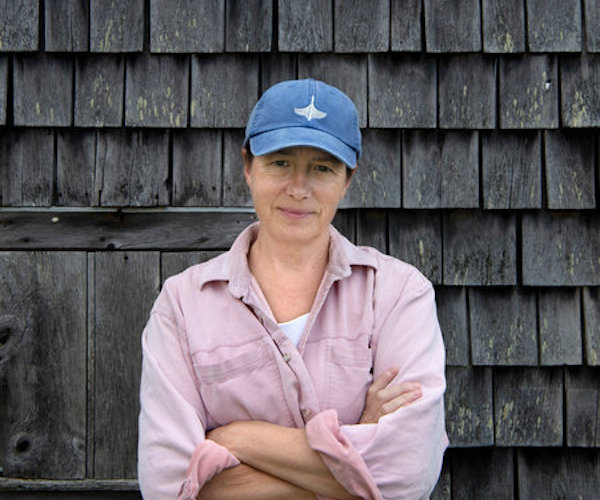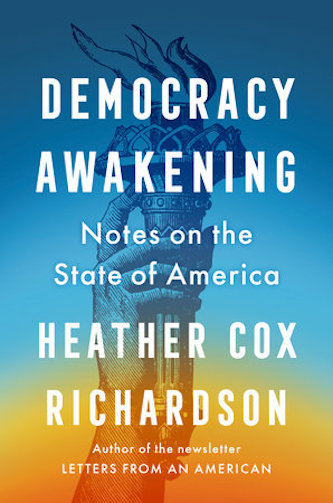Author Interview: Heather Cox Richardson on “Democracy Awakening”
By Blake Maddux
“The book in many ways is a defense of liberalism. It’s a defense of the idea that that’s really what the government should do in a democracy. The liberal consensus is what happens when you actually let people vote.”

Historian Heather Cox Richardson — her new book “might not be right, but it’s not stupid.” Photo: courtesy of the artist
On December 27, 2020, Ben Smith of the New York Times wrote that the pace at which historian Heather Cox Richardson works “isn’t sustainable.”
Over the course of the past two years, eight months, and three weeks, the paper of record’s media columnist has had to eat his words.
The latest edition of Richardson’s “Letters from an American” arrived in my inbox and those of more than one million others at 2:37 a.m. the morning of this writing.
Not only has the Boston College history professor sustained her Substack newsletter, she also co-hosted the podcast “Now & Then” with Yale historian Joanne Freeman between June 1, 2021, and September 13, 2023, when the final episode dropped.
“The timing couldn’t be better for me,” Richardson said in a recent phone interview with me of Vox Media’s decision to fold it.
Why? Because, as if to prove Ben Smith as wrong as possible, the book that she wrote between January 2022 and January 2023 is scheduled for publication on Tuesday, September 26.
“In my mind, the title was always ‘All I Know’,” the Maine native and resident told me. “But you can’t put that title on a book unless you’re, you know, Oprah Winfrey or something.”
Instead, she and her agent decided on “Democracy Awakening,” which derives from a Walt Whitman quote that serves as the book’s epigram: “Democracy … is a word the real gist of which still sleeps, quite unawaken’d.”
Richardson’s 20-date book tour includes a conversation with Meghna Chakrabarti at WBUR CitySpace (presented by Brookline Booksmith) on the book’s publication date and an appearance as the nonfiction keynote speaker at the Boston Book Festival on October 14.
Having interviewed her for the Arts Fuse during her pre-Substack stardom days in 2014 and again after it had been firmly established in 2020, it was an honor and a pleasure for me to do so in advance of the arrival of Democracy Awakening, of which the author herself modestly opined, “It might not be right, but it’s not stupid.”
The Arts Fuse: The subtitle confused me a bit because this book is not just a collection of notes. It is an organic, fully interconnected, 250-page work of the whole of American history, including the present.
 Heather Cox Richardson: I have to laugh about the subtitle, because “Notes on the State of America” is a play on Thomas Jefferson’s “Notes on the State of Virginia.” And the whole running joke on the podcast is how much I don’t like Thomas Jefferson. So that was kind of Jefferson getting the last laugh. I adamantly wanted it to be a play on a famous piece of American literature, just like “Letters from an American” is a play on “Letters from an American Farmer” [by J. Hector St. John de Crèvecœur, 1782] and “Letter from America” by Alistair Cooke.
Heather Cox Richardson: I have to laugh about the subtitle, because “Notes on the State of America” is a play on Thomas Jefferson’s “Notes on the State of Virginia.” And the whole running joke on the podcast is how much I don’t like Thomas Jefferson. So that was kind of Jefferson getting the last laugh. I adamantly wanted it to be a play on a famous piece of American literature, just like “Letters from an American” is a play on “Letters from an American Farmer” [by J. Hector St. John de Crèvecœur, 1782] and “Letter from America” by Alistair Cooke.
My wonderful assistant, a physics guy, was sitting at the computer going through famous American titles. Finally, he said “Hey Heather, how about ‘Notes on the State of Virginia’ but make it ‘Notes on the State of America’?” And I was like, “Oh darn it, he’s so right!” (laughs)
AF: Did you go into this book with a specific goal in mind, and is that reflected in the finished product?
HCR: I thought that it would contain answers to questions that people ask me every day. I didn’t really have a vision for it. I wrote a draft with the 30 chapters and put it aside for a few months. When I picked it back up, it seemed to me to be making an argument that I had not seen when I wrote it. That was the whole theoretical argument in it about the rise of authoritarianism in a democracy, focusing on the tools that authoritarians use.
And once I saw that, I couldn’t unsee it, and I basically rewrote about 80 percent of the book to make that argument. I felt with this book like I sort of turned it loose and all the chapters talked to each other and came up with their own vision of what the book should be. It’s not a book I set out to write. I was part of bringing it to life, but it feels a little bit like it’s taken on a life of its own, which I think is kinda cool.
AF: Part 1 (“Undermining Democracy”) starts at the New Deal and ends just before the 2016 election. Part 2 (“The Authoritarian Experiment”) covers the whole of the Trump administration. Part 3 (“Reclaiming America”) takes readers all the way back to the nation’s founding then touches on more or less every significant era of American history since then. What was the strategy behind the book’s somewhat atypical structure?
HCR: You’re the second person to say that it’s sort of an odd structure, but it honestly never occurred to me to do it any other way, because the book is how we got here, where here is, and how to get out.
So how we got here is the construction of a language and a false history to destroy democracy. In the book, I started quite deliberately by saying that the people who did that were not the conservatives that they claimed to be, but were dangerous radicals. Then I followed that through the different stages of authoritarianism and how you break down the liberal consensus.
Once you’ve got the rise of all of the pieces of authoritarianism, then the Trump years are about the construction of an authoritarian government.
That is probably what I found most shocking in that book. Once I stripped out all of the noise, I found it just absolutely chilling. We were so freaking close [to losing our democracy].
I thought, dear God, this middle section is so frightening. How many people will make it to the third one, which is a lightning fast trip through American history. That’s the fun one! Maybe I scared people so much that they won’t even get there!
AF: So how do we get out of where we are?
HCR: As an idealist — a historian who believes that ideas change the world — the answer for me is that we have to reconceive what democracy means and what our history means. And in order to do that, let’s take a much more comprehensive look at our history. You see that it includes great men, like Jefferson, but it’s also always in conversation with marginalized Americans, who keep the idea of equality before the law front and center and continually push the envelope of liberal democracy.
That changes our understanding of our history and our future, because it does in fact argue for a multicultural country. It argues that democracy is constantly under construction, as opposed to being perfect back in the past before marginalized people began to have ideas about their own equality.
AF: A common theme that I have picked up on in your three most recent books is the misuse of the word “socialism” by conservatives. What are the origins of this misuse?
HCR: After the passage of the 14th (1866) and 15th (1870) Amendments, the former Confederates, who refuse to accept the idea that Black Americans should have civil rights, recognized that they no longer have a constitutional argument to mistreat them on the basis of their race.
In 1871, they began to say that they don’t really have any problems with Black people as Black people. Their concern was that they were poor, and if they vote as poor men, what they’re voting for are politicians who will offer them things like schools and roads and hospitals. The only way that those things can be paid for is through taxes on people with property, and those people are all white. So Black people voting is a form of redistribution of wealth, and that’s socialism.
Nowadays, people like Marjorie Taylor Greene or Trump say that everybody who disagrees with them is a socialist and compare it to countries where socialist parties advocate nationalizing the means of production.
When was the last time anybody in America talked about actually seizing the means of production? It’s simply not in our vocabulary.
AF: What is the liberal consensus, which serves as an important throughline in the book?
HCR: The liberal consensus is a mindset — an ideology, if you will — that Americans built in the period from 1933 until 1981. It is the idea that the government has a role to play in regulating business, providing a basic social safety net, promoting infrastructure, and protecting civil rights.
And that was widely shared across all political parties in America after World War II, because the liberal consensus had helped America get out of the Depression and had won World War II against fascism. In the aftermath of World War II, it began to take on the idea of civil rights, and that’s the story of the ’50s, ’60s, and ’70s.
But there was a small group of people that really hated that because they didn’t like the ideas of business regulation, their tax dollars going to social welfare programs, public monies being spent on infrastructure, and they sure as hell didn’t like civil rights.
They called themselves conservatives, and much later on they became known as “movement conservatives” because it was a political movement. They weren’t ideologically conservative; they were ideologically quite radical. Their offshoot is today’s Freedom Caucus.
The book in many ways is a defense of liberalism. It’s a defense of the idea that that’s really what the government should do in a democracy. The liberal consensus is what happens when you actually let people vote.
Blake Maddux is a freelance journalist who regularly contributes to the Arts Fuse, Somerville Times, and Beverly Citizen. He has also written for DigBoston, the ARTery, Lynn Happens, the Providence Journal, The Onion’s A.V. Club, and the Columbus Dispatch. A native Ohioan, he moved to Boston in 2002 and currently lives with his wife and six-year-old twins — Elliot Samuel and Xander Jackson — in Salem, MA.
Tagged: "Letters from an American", American history, Democracy Awakening, Heather Cox Richardson, authoritarianism

HCR has been concerned and warning us for years about the slow destruction of our democracy by the MAGAs and the Freedom Caucus and their predecessors. Now she is leading the charge for us to reclaim it. Hope her new book is widely read.
Thank you for reading and commenting, Sue. We ignore Professor Richardson at our own peril!
Outstanding interview. We are in a dire place, and it is people like HRC who are showing us the way out.
Thank you, Jackie. Professor Richardson makes me look good as an interviewer!
Great interview. Hoping to get to your presentation in Boston on 11/1.
Thanks for an eye-opening interview. Going to Amazon now to order the book.
Thank you, Paul. I hope that you enjoy the book, and I am also certain that you will!